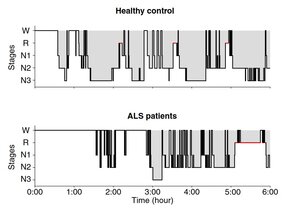Sleep disorders are well known in several neurodegenerative diseases, but remain little studied in the case of amyotrophic lateral sclerosis (ALS). In this new study, the authors focus on sleep changes and imbalances in hypothalamic signals in ALS patients.
Using sleep recordings (polysomnography), they observed that ALS patients, as well as asymptomatic carriers of certain genetic mutations (C9ORF72 and SOD1), spent more time awake and had reduced non-REM (or deep slow wave) sleep. These sleep disorders were associated with reduced cognitive performance in these groups. These results show that sleep disorders appear very early in the development of the disease.
Thanks to their experiments on murine models, they showed that these disorders were partly due to a population of neurons located in a region of the brain called the hypothalamus. These neurons secrete a neurotransmitter which is very important for sleep: orexin, and preventing the action of orexin is sufficient to completely correct sleep problems.
These findings suggest that orexin-producing neurons could become promising targets for treating sleep disorders that occur in the early stages of ALS.
- Discover the full article :
SJ. Guillot, C. Lang et al., Early-onset sleep alterations found in patients with amyotrophic lateral sclerosis are ameliorated by orexin antagonist in mouse models., Sci. Transl. Med. 17, eadm7580 (2025).

